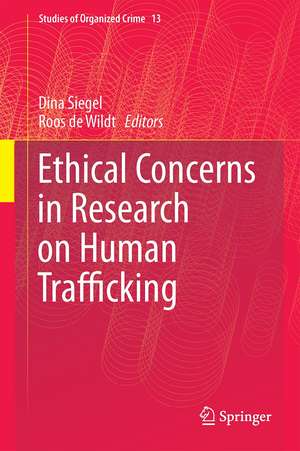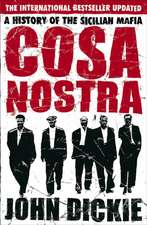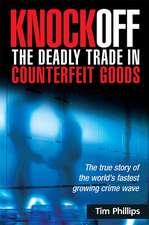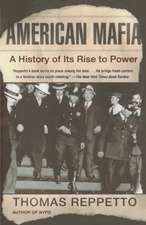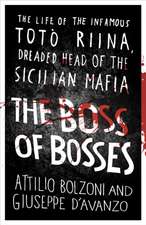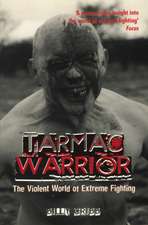Ethical Concerns in Research on Human Trafficking: Studies of Organized Crime, cartea 13
Editat de Dina Siegel, Roos de Wildten Limba Engleză Hardback – 16 dec 2015
Dr. Frank Bovenkerk, Professor (Emeritus), Willem Pompe Institute for Criminal Law and Criminology, Universiteit Utrecht, The Netherlands
This book allows a peek in the kitchen of empirical fieldwork, going into not only “best practices,” but mistakes made, in a frank, courageous and honest way.
Dr. Brenda C. Oude Breuil, Willem Pompe Institute for Criminal Law and Criminology, Universiteit Utrecht, The Netherlands
| Toate formatele și edițiile | Preț | Express |
|---|---|---|
| Paperback (1) | 640.37 lei 6-8 săpt. | |
| Springer International Publishing – 27 mar 2019 | 640.37 lei 6-8 săpt. | |
| Hardback (1) | 646.62 lei 6-8 săpt. | |
| Springer International Publishing – 16 dec 2015 | 646.62 lei 6-8 săpt. |
Din seria Studies of Organized Crime
- 15%
 Preț: 643.16 lei
Preț: 643.16 lei -
 Preț: 394.51 lei
Preț: 394.51 lei - 15%
 Preț: 636.12 lei
Preț: 636.12 lei - 15%
 Preț: 642.03 lei
Preț: 642.03 lei - 15%
 Preț: 650.86 lei
Preț: 650.86 lei - 18%
 Preț: 790.14 lei
Preț: 790.14 lei - 15%
 Preț: 637.59 lei
Preț: 637.59 lei - 18%
 Preț: 889.92 lei
Preț: 889.92 lei - 15%
 Preț: 641.03 lei
Preț: 641.03 lei - 15%
 Preț: 524.36 lei
Preț: 524.36 lei - 18%
 Preț: 781.94 lei
Preț: 781.94 lei - 18%
 Preț: 892.28 lei
Preț: 892.28 lei - 15%
 Preț: 637.46 lei
Preț: 637.46 lei - 18%
 Preț: 1853.06 lei
Preț: 1853.06 lei - 18%
 Preț: 1115.14 lei
Preț: 1115.14 lei - 15%
 Preț: 642.51 lei
Preț: 642.51 lei -
 Preț: 384.86 lei
Preț: 384.86 lei - 15%
 Preț: 641.20 lei
Preț: 641.20 lei
Preț: 646.62 lei
Preț vechi: 760.73 lei
-15% Nou
Puncte Express: 970
Preț estimativ în valută:
123.73€ • 129.53$ • 102.38£
123.73€ • 129.53$ • 102.38£
Carte tipărită la comandă
Livrare economică 05-19 aprilie
Preluare comenzi: 021 569.72.76
Specificații
ISBN-13: 9783319215204
ISBN-10: 3319215205
Pagini: 300
Ilustrații: XV, 277 p. 5 illus., 3 illus. in color.
Dimensiuni: 155 x 235 x 25 mm
Greutate: 0.59 kg
Ediția:1st ed. 2016
Editura: Springer International Publishing
Colecția Springer
Seria Studies of Organized Crime
Locul publicării:Cham, Switzerland
ISBN-10: 3319215205
Pagini: 300
Ilustrații: XV, 277 p. 5 illus., 3 illus. in color.
Dimensiuni: 155 x 235 x 25 mm
Greutate: 0.59 kg
Ediția:1st ed. 2016
Editura: Springer International Publishing
Colecția Springer
Seria Studies of Organized Crime
Locul publicării:Cham, Switzerland
Public țintă
ResearchCuprins
Chapter 1: Introduction: the variety of ethical dilemmas (Dina Siegel and Roos de Wildt).- Part I: Sex trafficking.- Chapter 2: Getting the balance right: the ethics of researching women trafficked for commercial sexual exploitation (Helen Easton and Roger Matthew).- Chapter 3: Ethics as process, ethics in practice: researching the sex industry and trafficking (Liz Kelly and Maddy Coy).- Chapter 4: Ethnographic research on the sex industry: the ambivalence of ethical guidelines (Roos de Wildt).- Chapter 5: Ethnicity, crime and sex work – a triple taboo (Dina Siegel).-Chapter 6: The Ethical Minefield in Human Trafficking Research—Real and Imagined (Sheldon X. Zhang).- Part II: Labour trafficking.- Chapter 7: Negotiating anonymity, informed consent and ‘illegality’: researching forced labour experiences among refugee and asylum seeker in the UK (Hannah Lewis).- Chapter 8: Ethics, methods and moving standards in research on migrant workers and forced labour(Sam Scott and Alistair Geddes).- Chapter 9: Doing no harm. Ethical challenges in research with trafficked persons (Rebecca Surtees and Anette Brunovskis).- Chapter 10: Trust, Rapport and Ethics in Human Trafficking Research: Reflections on Research with Male Labourers from South Asia in Singapore (Sallie Yea).- Part III: Child trafficking.- Chapter 11: Getting What We Want: Experience and
Impact in Researchwith Survivors of Slavery (Zhaleh Boyd and Kevin Bales).- Chapter 12: No Love for Children: Reciprocity, Science and Engagement in the Study of Child Sex Trafficking (Anthony Marcus and Ric Curtis).- Chapter 13: Walking the tightrope: Ethical dilemmas of doing fieldwork with youth in US sex markets (Amber Horning and Amalia Paladino).- Part IV: Organ trafficking.- Chapter 14: At the Organ Bazaarof Bangladesh: In Search of Kidney Sellers (Monir Moniruzzaman).- Chapter 15: On Adopting Heretical Methods-From Barefoot to Militant to Detective Anthropology (Nancy Scheper-Hughes).
Impact in Researchwith Survivors of Slavery (Zhaleh Boyd and Kevin Bales).- Chapter 12: No Love for Children: Reciprocity, Science and Engagement in the Study of Child Sex Trafficking (Anthony Marcus and Ric Curtis).- Chapter 13: Walking the tightrope: Ethical dilemmas of doing fieldwork with youth in US sex markets (Amber Horning and Amalia Paladino).- Part IV: Organ trafficking.- Chapter 14: At the Organ Bazaarof Bangladesh: In Search of Kidney Sellers (Monir Moniruzzaman).- Chapter 15: On Adopting Heretical Methods-From Barefoot to Militant to Detective Anthropology (Nancy Scheper-Hughes).
Notă biografică
Dina Siegel is a professor of Criminology and chair of the Willem Pompe Institute for Criminal Law and Criminology at Utrecht University, the Netherlands. She received her Ph.D. in Cultural Anthropology at the VU University, Amsterdam. She has published on the Russian mafia, human trafficking, legalized prostitution, underground banking, XTC trafficking, terrorism, crimes in the diamond industry, and the role of women in criminal organizations. Her most recent books are Traditional Organized Crime in the Modern World (with Henk van de Bunt), Springer, 2012; Mobile banditry. East and Central European Itinerant Criminal Groups in the Netherlands, Eleven International Publishing, 2014. She also published different articles on the position of sex workers and on ethnographic research on prostitution in the Netherlands.
Roos de Wildt is conducting her PhD research in Cultural and Global Criminology at Utrecht University, The Netherlands and the University of Hamburg, Germany. She is studying prostitution and human trafficking for sexual purposes in Kosovo. The aim of this project is to explore how war and a transition process shape these phenomena. She conducted further ethnographic fieldwork on the trafficking of Romanian women to Italy after Romania entered the European Union, the future perspectives of youth in post-conflict Guatemala, prostitution in the Dutch municipality of Almere, child trafficking in The Netherlands and the closing of
designated prostitution areas in Utrecht, The Netherlands. After obtaining her Master of Science in Cultural Anthropology Roos worked as an international project manager at NGOs between 2007 and 2011, during which she was mainly responsible for the implementation of projects in Central and Eastern Europe.
Roos de Wildt is conducting her PhD research in Cultural and Global Criminology at Utrecht University, The Netherlands and the University of Hamburg, Germany. She is studying prostitution and human trafficking for sexual purposes in Kosovo. The aim of this project is to explore how war and a transition process shape these phenomena. She conducted further ethnographic fieldwork on the trafficking of Romanian women to Italy after Romania entered the European Union, the future perspectives of youth in post-conflict Guatemala, prostitution in the Dutch municipality of Almere, child trafficking in The Netherlands and the closing of
designated prostitution areas in Utrecht, The Netherlands. After obtaining her Master of Science in Cultural Anthropology Roos worked as an international project manager at NGOs between 2007 and 2011, during which she was mainly responsible for the implementation of projects in Central and Eastern Europe.
Textul de pe ultima copertă
Thisbook presents a vivid description of the solutions that researchers havediscovered for ethical dilemmas that pose themselves at studying disadvantaged,vulnerable and victimized populations. Ethical codes prescribe that the scholarshould in all circumstances avoid potential harm, that informed consent isnecessary and that the limits of confidentiality should always be respected.However, in the practice of research among women involved in prostitution,illegal immigrant workers, enslaved children, people who sell their organs andall the traffickers thereof, the ethical rules cannot always be followed. Thisbook shows that there is a surprising variety of arguable possibilities indealing with ethical dilemmas in the field. Authors reflect on concreteexperiences from their own fieldwork in a wide variety of settings such as theUSA, Singapore, Kosovo and The Netherlands. Some choose to work on the basis ofconscientious partiality, others negotiate the rules with their informants andstill others purposely break the rules in order to disclose and damage theexploiters. Researchers may find themselves in a vulnerable position. Theirexperiences, as presented in this volume, will help field workers, university administrators, representativesof vulnerable groups, philosophers of ethics and most of all students to gointo the field well-prepared.
Thisis a book that every researcher planning to do fieldwork in the difficult fieldof hidden, illicit and victimized people should read in advance.
Dr.Frank Bovenkerk, Professor (Emeritus), Willem Pompe Institute for Criminal Lawand Criminology, Universiteit Utrecht, The Netherlands
This bookallows a peek in the kitchen of empirical fieldwork, going into not only “bestpractices,” but mistakes made, in a frank, courageous and honest way.
Dr. Brenda C. Oude Breuil, Willem Pompe Institute forCriminal Law and Criminology, Universiteit Utrecht, The Netherlands
Thisis a book that every researcher planning to do fieldwork in the difficult fieldof hidden, illicit and victimized people should read in advance.
Dr.Frank Bovenkerk, Professor (Emeritus), Willem Pompe Institute for Criminal Lawand Criminology, Universiteit Utrecht, The Netherlands
This bookallows a peek in the kitchen of empirical fieldwork, going into not only “bestpractices,” but mistakes made, in a frank, courageous and honest way.
Dr. Brenda C. Oude Breuil, Willem Pompe Institute forCriminal Law and Criminology, Universiteit Utrecht, The Netherlands
Caracteristici
Examines the ethical and safety issues involved in studying human trafficking Provides various perspectives on observing versus intervening where human victims are involved Offers a mix of theoretical perspectives, guidelines and case studies for this important topic Includes supplementary material: sn.pub/extras
